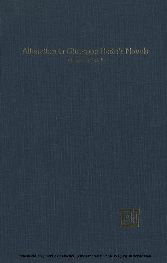Suchen und Finden
Introduction (p. 1)
Giuseppe Berto (1914-1978) is a popular but controversial Italian author whose artistic endeavors include fiction, journalism, playwriting, and cinematography. He published nine novels, three plays, a science fiction "fable," and several short stories. He also wrote thé screenplays from some of his novels, which then became successful movies.
Of many writers who hâve used humor to cope with thé absurd, Berto succeeded in both his life and his work. An important Italian literary figure, native of Momigliano Veneto, near Trieste, Berto reveals in his writings thé influence of thé mittel-european héritage of Freud, Kafka, Svevo and Joyce, what is commonly referred to as thé literature of introspection and neurosis.
Despite thé commercial popularity of his works, Berto received mixed critical attention and often has been omitted from surveys of contemporary Italian literature. Olga Lombards, in her valuable monographie study (1974) of Berto, states that he is a most représentative contemporary Italian writer: "Di tutti questi momenti e trapassi Berto è uno dei testimoni più attendibili" (25).
Berto states that his fiction constitutes a "letteratura d`alienazione." Critics, though, tend to minimize this statement. At most, they recognize a dominant concern in Berto for thé distorted, neurotic psychés of thé characters of his novels, and lament that thé author did not equally emphasize thé social conditions responsible for their aliénation.
Berto says: "La critica marxista... mi accusa di aver tralasciato i terni sociali, perché mi sono sottratto all`alienazione marxista. According to him, existential conviction, aliénation is not thé resuit of perverted économies but rather is a malaise pervading contemporary society.
The son of a "maresciallo dei carabinieri," Berto grew up in a climate of fervid idealism and of strict moral principles, devoid of a warm family environment. In 1935 when Berto was twenty-one years old, he joined thé fascist army in Ethiopia. Although he was wounded there his valor earned him two medals: "si guadagnô per il suo eroico comportamento in battaglia una medaglia d`argento e una di bronzo al valor militare."
War unveiled to thé young idealistic Berto thé horrors of thé human life. Having been sheltered up until that time in thé rose-colored world of patriotism that thé fascist régime sought to portray, Berto fell easy victim to thé realities of pain, violence, and death in thé Ethiopien war.
His first-hand expérience with pain, which came as thé resuit of wounds suffered in Ethiopia, and his expérience as a "camicia nera" fighting in northern Africa, resulted in a psychological shock which caused him to lose his idealism and cast him into thé void of doubt and uncertainty.
In thé following passage, Berto speaks of his shattered ideals: "La grandezza délia nazione, la potenza militare italiana, l`unione di tutto un popolo intorno al duce, una finale onestà dei fascisme" (IA, 20).
Death became a concrète reality for Berto. The trauma of war and thé disillusionment with his political ideals led him to a distorted vision of life and of men. With his typical masochistic honesty thé author explains in thé Inconsapevole approccio thé influence of war`s ugly expériences on his writings.
Alle Preise verstehen sich inklusive der gesetzlichen MwSt.








